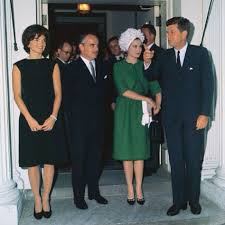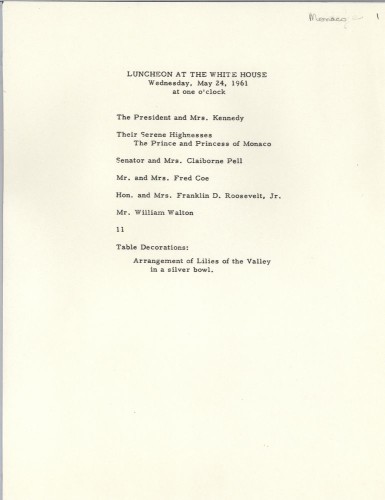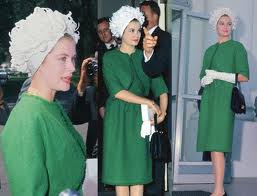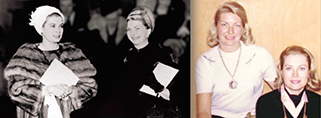

JFK-(Grace Kelly) Princess Grace & Prince Rainier Lunch at White House – Courtesy of JFK Presidential Library
Many people may think that May 24, 1961 was the first time that Grace Kelly met JFK but this is not true … their first meeting was quite amusing. However, May 24, 1961 is when Princess Grace of Monaco (and Prince Rainier of course) had lunch at the White House with President John F. Kennedy.
On June 19, 1965, Grace Kelly, then formally known as H.S.H. Princess Grace of Monaco, participated in a oral history project for the JFK Library. Author (and friend) Paul Gallico interviewed Princess Grace, as the Princess of Monaco discusses the lunch she had with John F. and Jacqueline B. Kennedy, and John F. Kennedy’s legacy in a world, among other issues.
Portions of this Grace Kelly – JFK interview have been ‘unearthed’ but one should be aware of two major factors: the recent Grace Kelly-JFK interview on You Tube (by PBS Digital) is not the complete version and the voice of Grace Kelly has been distorted (this may have occurred in the original tape … and only those who really knew Grace could probably tell the difference). In an effort to set the record straight, below you will find the full transcript for your review as it reveals in more depth the characters of both JFK and Grace Kelly.
Complete Transcript of Oral History Interview
(for educational review and use only – PLEASE DO NOT REPOST)
June 19, 1965 Palace of the Principality, Monaco
By Paul Gallico with H.S.H. Princess Grace of Monaco
GALLICO: Your Highness, when today you think of the late President Kennedy [John F. Kennedy], what is it that comes to your mind most vividly—or, shall we say, to your heart?
GRACE: His youth. He was one of my own generation, so that for the first time in my life I became deeply involved, spiritually, and sympathetically, with the presidency—the office as well as the man. I felt personally involved.
GALLICO: Speaking as an American?
GRACE: Oh, yes, as a born American but also as the wife of the head of an independent European country. President Kennedy’s youthfulness and vitality appealed so strongly to my husband [Rainier III, Prince of Monaco] and myself.
GALLICO: Yes, it would, of course.
GRACE: We felt somehow that at last the United States had a leader who, from the point of view of age, appearance, and dynamic personality, genuinely reflected his era. My husband often remarked what a pity it was that a great country like America, which in Europe is still regarded as such a young nation, should be represented seemingly only by old or infirm men—I don’t mean this as any reflection upon past presidents, but then all countries mostly have older men at their head, with the younger ones so rarely given a chance.
GALLICO: Until Mr. Kennedy.
GRACE: Yes, he was almost too good to be true—he was just like the All-American boy, wasn’t he, handsome, a fighter, witty, full of charm….
GALLICO: Your highness, you mentioned before your spiritual as well as emotional involvement. What did you mean by spiritual?
GRACE: I was thinking of the background of Irish Catholicism of both of our families, as well as the fact that Monaco is a Catholic country. This was another bond between us and brought him closer to us here, perhaps, more than any other president and made his death an even greater blow—to lose such a man and such a mind.
GALLICO: And when we most needed him.
GRACE: And he and his wife made such an appealing and attractive young married couple, too. We all identified with them. I think for the first time the White House was brought so much closer. People began to read about it and take an interest in it almost as they did in their own homes. When Jacqueline Kennedy [Jacqueline Bouvier Kennedy] redecorated it, every young housewife was decorating it with her.
GALLICO: What was your impression gained from meeting with him personally?
GRACE: I think his humanity and interest in everything and the fact that he could listen as well as talk. I remember the luncheon that we were privileged to have at the White House. I’m afraid I chattered a great deal about the Red Cross and the fact that certain countries were using it for political and particularly anti-American propaganda.
GALLICO: You knew about this?
GRACE: I couldn’t help but know. As President of the Monegasque Red Cross and member of the International Organization at Geneva, I received documents from all over the world and many of these from eastern countries are filled with anti-American bias and propaganda. Actually, the day before I attended this luncheon I had seen one from Korea accusing American soldiers of atrocities, with a list of trumped up charges. I was still so angry about this that before I knew it, I had told Mr. Kennedy about it.
GRACE: I think he was both surprised and shocked himself. He asked me one or two revealing questions that showed interest and concern. I could see by the expression on his face that it was something he was going to look into.
Oh, and then another side of him I remember—later at that same luncheon….
GALLICO: Yes….?
GRACE: (With amused recollection.) He turned to me suddenly and asked: “Is that a Givenchy you’re wearing?” The astonishing thing was that day, that particular dress just happened to be one.
I said, ‘ ‘How clever of you, Mr. President! However did you know?”
“Oh,” he replied, ‘‘I’m getting pretty good at it—now that fashion is becoming more important than politics and the press is paying more attention to Jackie’s clothes than to my speeches.”
This was just around the time the Americans were becoming aware that in Mrs. Kennedy there was a genuine leader of women’s fashions in the White House again.
GALLICO: Do you remember who some of the other guests at that luncheon were, Your Highness?
GRACE: It was just a small one. Besides my husband there was Franklin Jr., Mr. and Mrs. Fred Coe.
GALLICO: Fred Coe—now isn’t he….
GRACE: He’s a director and well known producer. He gave me my first television job on the Philco Playhouse. He was President Kennedy’s TV adviser during his campaign also.
GALLICO: Do you happen to recall what was served at the luncheon?
GRACE: Yes, I do. For I kept the menu. I’m one of those people who keep everything. We had soft-shelled crabs and spring lamb and strawberries Romanov.
GALLICO: And what happened after the luncheon?
GRACE: The President and Mrs. Kennedy took us around the White House and showed us many of the rooms. We saw the Lincoln room [Abraham Lincoln] and the famous bed, which was especially interesting for Fred Coe and myself.
GALLICO: Oh…?
GRACE: Well, you see one of the first TV shows he produced in which I acted, was a story of the young Lincoln, and I played Ann Rutledge. The President was also very proud of some paintings of American Indians he had just bought and enjoyed showing them to us. I don’t remember the painter but they were striking and wonderful Americana. The way the President talked about them gave us the feeling that he loved and was excited about everything that was, or had been a part of his country.
GALLICO: Did you have a chance to speak further with him?
GRACE: Not really, for Mrs. Kennedy and I fell into woman talk, with a discussion of our children of course—our two Carolines [Caroline Bouvier Kennedy; Princess Caroline]—and our special problems connected with bringing them
GALLICO: Yes, of course there would be those problems.
GRACE: I remember Jackie was very upset about that time at the photographers who were hounding the children. She was determined that Caroline and John [John F. Kennedy, Jr.] should be able to get in and out of the White House without being pestered by photographers, or being made constantly aware of their position. My Caroline was with me in the United States at the time and it was all somewhat confusing for her, too. I remember once we were watching the televising of a ceremony outside the White House and she saw Jackie Kennedy’s Caroline peering out from behind a curtain and asked, “Mummy, why is Princess Kennedy’s house white?”
GALLICO: Was this the first time that you had met the President?
GRACE: Actually, no. The first time was before he became the President, during that year he was in the hospital in New York with his back. I had been to a dinner party where I had met Mrs. Kennedy and her sister [Lee Bouvier Kennedy] for the first time. They asked me to go to the hospital with them to pay a visit and help cheer him up. They wanted me to go into his room and say I was the new night nurse.
GALLICO: That was a quaint idea. Did you?
GRACE: Well I hesitated! I was terribly embarrassed. Eventually I was sort of pushed into his room by the two girls. I introduced myself, but he had recognized me at once and couldn’t have been sweeter or more quick to put me at ease.
GALLICO: Your Highness—politically, what would you say was the appeal to the people of your principality of President Kennedy?
GRACE: Most certainly his efforts on behalf of international peace. He not only spoke for peace, but we felt that he was actively engaged in doing something about it. What he was working to achieve brought the same hopes and lifting up of hearts to us here in Monaco as did an earlier effort by one of our own princes to outlaw war and bring the great nations together.
GALLICO: Here in Monaco? When was that, Your Highness?
GRACE: It was before the League of Nations—even before the first World War, around 1911, when Prince Albert [Albert I, Prince of Monaco], my husband’s greatgrandfather, foresaw the trend towards war unless something was done to check it. He founded an organization called The Institute of Peace and invited the nations to discuss their differences around the conference table, here in Monaco.
GALLICO: And did they?
GRACE: There were several meetings held, but unfortunately it was already too late. The Germans were armed and only awaiting their opportunity. Prince Albert even went to the German Kaiser [Wilhelm II]—he used to go yachting with him and so he knew him very well—and tried to persuade him to keep the peace. Monegasques, sandwiched between France and Italy, know what war is like and hate it. Even though they declared their neutrality in the last war, they were bombed and occupied by both the Italians and the Germans. But in addition to his efforts for peace, there was still another link we felt with President Kennedy.
GALLICO: and that was… ?
GRACE: His interest in the promotion of all the arts. From the moment he became President, it seemed as though a wave of excitement ran through all of the young painters, poets, writers and musicians of the United States. Now that someone of their own age was in the White House, there was somehow a better chance for them to be seen or heard. There are some leaders who appear from time to time who have the great gift of stimulating creative talents.
GALLICO: Like the Bourbons and the Medicis?
GRACE: Exactly. And see what a precedent has been set by his tremendous drive, for it is continuing now under President Johnson [Lyndon B. Johnson]. We could appreciate this, because the Grimaldi family has made the same efforts in Monte Carlo.
GALLICO: As an American, transplanted into an ancient European country and culture, were you as greatly affected by the death of the President as those closer to the scene in the United States?
GRACE: Oh, more so, I can assure you. He was such a strong tie with home. I think all Americans abroad felt this. It was as though I had lost a member of my own family. One seemed to know him so well, at least his public image and all the things he stood for. They had been the same things we had been taught to respect or fight for when we were children at home. I find this so difficult to express because it has already been said so often and so much better, but he warmed the heart and lifted up one’s courage.
GALLICO: I think many in Europe shared this feeling….
GRACE: That is true. None of us here realized until his death how deeply the people in this part of the world felt about him. There had been so much anti- Americanism in recent years. It seemed as though everyone had forgotten what America had done for them, not only during the war, but afterwards. European nations had for so long been dependent upon the United States, and even though they hated to admit it. It was almost as though they couldn’t bear the good fortune of America in finding such a young and forward-looking man, and resented it and him.
GALLICO: One was very conscious of this, living abroad.
GRACE: Then his death broke through all of this feeling and everyone in this country and all through France as well, mourned him and was deeply shocked. They were even a little frightened at his loss, and perhaps even more because during his all too brief tenure of the presidency, they had failed to realize what he had come to mean to them or recognize the waves of confidence and hope he was radiating.
GALLICO: Do you feel that his life—and death, will have any lasting effect upon international relationships?
GRACE: Are you asking me whether I think that President Kennedy died in vain?
GALLICO: In a sense—yes.
GRACE: Well, it might not seem so today, but I, for one, cannot believe that a man of Mr. Kennedy’s stature and achievements was put upon this earth for no other purpose than to stop an assassin’s bullet, or that the lesson will be wholly lost. It is only since the twentieth century that the majesty of Abraham Lincoln has been appreciated. I believe that God allows these certain tragedies to happen in order to emphasize the man and his achievements and to inspire those who follow to have the strength and the will to accomplish his unfulfilled dreams.
GALLICO: Thank you, Your Highness, Princess Grace.
[END OF INTERVIEW]
H.S.H. Princess Grace of Monaco Oral History Transcript
Grace de Monaco, recorded interview by Paul Gallico, June 19, 1965, for the John F. Kennedy Library Oral History Program.
The copyright law of the United States (Title 17, United States Code) governs the making of photocopies or other reproductions of copyrighted material. Under certain conditions specified in the law, libraries and archives are authorized to furnish a photocopy or other reproduction. One of these specified conditions is that the photocopy or reproduction is not to be “used for any purpose other than private study, scholarship, or research.” If a user makes a request for, or later uses, a photocopy or reproduction for purposes in excesses of “fair use,” that user may be liable for copyright infringement. This institution reserves the right to refuse to accept a copying order if, in its judgment, fulfillment of the order would involve violation of copyright law. The copyright law extends its protection to unpublished works from the moment of creation in a tangible form. Direct your questions concerning copyright to the reference staff.


















